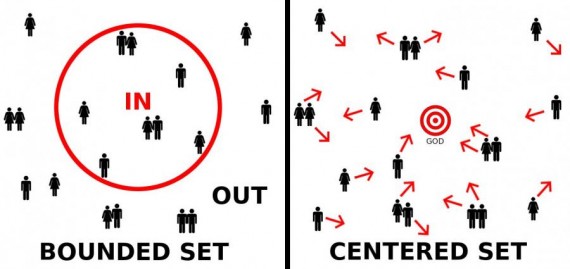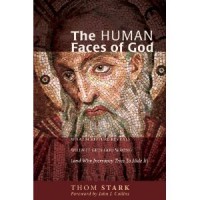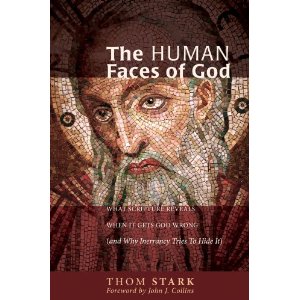
In the past few posts, I have discussed Bounded Sets vs. Centered Sets, and have stated that I believe that one of the best approaches for churches in our culture and society is a Centered Set approach, where there is no “us vs. them” mentality, or trying to decide who is “in” and who is “out.” Instead, we place Jesus Christ at the center of all humanity, and then view ourselves and others in relation to our proximity to Him, and our movement either toward or away from Him. In this way, everybody is “in.” Everybody belongs. Everybody can get involved.
Some fear that a Centered Set approach leads to Universalism, that all people are “saved.”
Does Centered Set Theology Lead to Universalism?
 I don’t think a Centered Set approach leads to universalism. To the contrary, I think a Centered-Set approach best reflects biblical theology.
I don’t think a Centered Set approach leads to universalism. To the contrary, I think a Centered-Set approach best reflects biblical theology.
First, when we say that all people are “in” we don’t mean that all people are justified or have eternal life. At least, I don’t mean this.
I believe that on the cross, Jesus Christ actually paid for the sins of the entire world. Not potentially, but actually. He really did pay for the sins of the entire world. Everyone is forgiven. Every single man, woman, and child is completely forgiven for every sin, past, present, and future. (Except for the sin of blasphemy against the Holy Spirit. But I am not about to get into that issue here.)






 One concept that really helps grasp the concept of living and ministering without doctrinal statements is idea of bounded and centered sets. This ideas was initially developed over 30 years ago by missiologist and anthropologist Paul Hebert in his book
One concept that really helps grasp the concept of living and ministering without doctrinal statements is idea of bounded and centered sets. This ideas was initially developed over 30 years ago by missiologist and anthropologist Paul Hebert in his book  If it helps, you can think of a bounded set as a Western style horse corral. The cowboys build the fence to keep the horses from wandering away. Outside the fence is where wild beasts and rustlers reside, just looking for a chance to kill or steal a horse.
If it helps, you can think of a bounded set as a Western style horse corral. The cowboys build the fence to keep the horses from wandering away. Outside the fence is where wild beasts and rustlers reside, just looking for a chance to kill or steal a horse.

 Chapters 1-3 reveal in stark reality the difficulties with the doctrine of inerrancy. In these chapters he shows why Scripture is not divine inerrant Word of God, and argues that such a view is impossible if we deal seriously and literally with the text, the way we all claim to do. Furthermore, he argues that the view of inerrancy is detrimental to our spiritual growth as followers of Jesus.
Chapters 1-3 reveal in stark reality the difficulties with the doctrine of inerrancy. In these chapters he shows why Scripture is not divine inerrant Word of God, and argues that such a view is impossible if we deal seriously and literally with the text, the way we all claim to do. Furthermore, he argues that the view of inerrancy is detrimental to our spiritual growth as followers of Jesus.


 In his letters to the Corinthians, Paul corrects numerous practical and doctrinal issues within the church. But at one point, in the middle of dealing with the divisive doctrine of spiritual gifts, and after begging with the Corinthian believers to live in unity with one another, he shows them the key to unity.
In his letters to the Corinthians, Paul corrects numerous practical and doctrinal issues within the church. But at one point, in the middle of dealing with the divisive doctrine of spiritual gifts, and after begging with the Corinthian believers to live in unity with one another, he shows them the key to unity.
 In a previous post, I listed three ways
In a previous post, I listed three ways 



 But of course, every single car had a “Jesus Loves You” sign next the candy. And I think we got invited to church about four or five times. We also received several Gospel Tracts along with the tiny piece of candy.
But of course, every single car had a “Jesus Loves You” sign next the candy. And I think we got invited to church about four or five times. We also received several Gospel Tracts along with the tiny piece of candy.
 Maybe I haven’t studied eschatology (the study of the End Times) as much as I should have, or maybe I just don’t care about it too much (the world has enough problems today for me to worry about the problems in the future), but as I read
Maybe I haven’t studied eschatology (the study of the End Times) as much as I should have, or maybe I just don’t care about it too much (the world has enough problems today for me to worry about the problems in the future), but as I read 